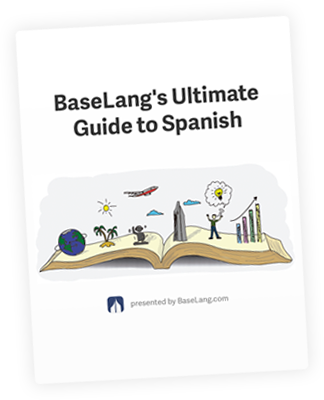From Patagonia to Santiago: 47 Chilean Slang Words You Should Know

Get our free email course, Shortcut to Conversational.
Have conversations faster, understand people when they speak fast, and other tested tips to learn faster.
More infoWhen you travel abroad, there are two ways to almost guarantee a better experience 1) learn the local language 2) know some local slang terms. In the post, we are going to cover the latter, so if you ever find yourself in the bustling city of Santiago, or hiking in Patagonia, you have enough Chilean slang to make an impression with the locals.
This post is the latest in a series of Spanish slang posts in which we have already covered:
Today, we’re covering the most commonly used slang in Chile.
1) Achacarse
If you’re having a bad day and at some point, you start to feel sad, this verb is what you’re looking for.
- No te achaques – Don’t be sad
2) Al lote
When something is done in a disorganized or chaotic way
- Hice este ensayo al lote – I did this essay in a disorganized way.
3) Al toque
Let’s imagine that you are in a hurry and something needs to be done as fast as possible. In this case, we’ll use this expression for saying immediately or right now
- ¡Vamos al toque! – Let’s go right now
4) Andar pato
Used to express not having any money at that moment.
- No puedo ir con ustedes, ando pato – I can’t go with you guys, I don’t have money
5) ¡Andate a la chucha!
This expression is something you might hear while people are arguing, one of them gets angry and kindly invites their partner to go to hell.
- ¡Andate a la chucha Carlos! No quiero hablar más contigo – Go to hell Carlos! I don’t want to talk with you anymore
6) Atao
Whenever you find yourself surrounded by problems, this is the word to use.
- Tengo muchos ataos con mi pololo – I have a lot of problems with my boyfriend
7) Bacán
A very common expression for saying something or someone is cool, great or awesome. If you visit Chile, then you’re likely to see how Bacán that country is.
- Ese weon es bacán – That guy is awesome
- Ese carrete estuvo bacán – The party was great
8) Bronca
Can refer to a fight, or when a person is upset with someone else.
- Hubo bronca en la calle ayer – There was a fight on the street yesterday
9) Buena onda
Let’s say you meet a nice person while visiting Chile, then you can use this expression to let them know how much you think of them.
- María es buena onda – María is a nice person
- Esa mina es buena onda – That lady is nice
10) Cachar
Means to understand or to know something. Seems to come from the English verb “to catch”. It is common to hear it with an (-i) at the end: cachai.
- ¿Si cachai el tema de la película? – Did you know what the movie was about?
- No puedes hacer eso ¿Cachai? – You can not do that, understand?
11) Cahuín
An ill-intentioned piece of gossip that could cause trouble. Be careful with this word as it also means brothel (we’re serious).
- Ese cahuín los alejó – That gossip drove them apart
12) Caleta
We can translate this as: a lot, much or many.
- Te quiero caleta – I love you so much
- Había caleta de gente – There were too many people
- Comiste caleta hoy – You ate a lot today
13) Chorearse
Depending on the context, this word means both to get angry about something, to steal, or be bored.
- Julio se choreó con su familia – Julio was upset with his family
- Alguien se choreó mi lápiz – Someone stole my pencil
- Estoy muy choreado – I’m really bored
14) Caña
After one (or seven) too many drinks, you might wake up the next day with one of these. Nobody likes a hangover!
- ¡Tengo caña! – I’m hungover!
15) Carrete/Carretear
If you want to go to a party and have some fun, you may ask when and where is the Carrete. On the other hand, Carretear (as a verb) means to party.
- Ese carrete estuvo fome – That party was boring
- Vamos el viernes a carretear – Let’s party on Friday
16) Copete
This word is used to refer any alcoholic drink.
- Me fui a tomar unos copetes – I went for some drinks
17) Curado
If you are in a carrete (party), having some fun and drinking a lot of copetes (alcoholic drinks), then you might end up curado, that is, wasted.
- ¡Estoy curada! – I’m drunk!
(Sidenote: This can also mean “cured” in a more formal context.)
18) Cuico/ca
Whenever a Chilean sees a wealthy or rich person, you may hear this word.
- Tu pololo es un cuico – Your boyfriend is a rich person
19) Condoro
Usually means a mistake. This comes from a famous Chilean comic strip, Condorito, based on the life of an anthropomorphic Condor who lived in a small town in Chile. This character is always involved in some embarrassing situations because of his clumsiness.
- Te mandaste un condoro – You made a mistake
20) Dar jugo
This phrase is used when someone is talking nonsense.
- María está dando jugo – María is talking nonsenses
21) Dar pelota
An expression that means to pay attention to something or someone.
- Roberto no me da pelota – Roberto is not paying me attention
22) Engrupir
When you are meeting a girl/boy that you really like, we can say you are “engrupiendo”. As a verb, it means to flirt.
- Estaba engrupiendo a Carla – I was flirting with Carla
23) Estar chato
Used as phrase when you have nothing to do and want to express how boring the situation is, or how bored you feel.
- Estoy chato de las clases – I’m bored of the classes
24) Flaite
Refers to a person, place or thing considered tacky.
- Ese weon es muy flaite – That guy is so tacky
- Ese bar es flaite – That bar is tacky
25) Fome
A very common word used to say boring.
- ¡Qué fome este carrete! – How boring this party!
26) Gallo/a
Same as the word Guy in English, Gallo/a means girl or boy, of all ages and conditions.
- Ese es el gallo que trabaja conmigo – That’s the guy that works with me
27) Guagua
While walking on the street surrounded by people you might hear this word as a way to talk about a baby.
- Tienes que ir a cuidar al guagua – You have to take care of the baby
28) Guata
It is used to talk about the abdominal region.
- Tengo dolor en la guata – I have a stomachache
29) Huevón
Pronounce as “hueon” or “weon”, it can have various meanings depending on the context, who are you talking with and the tone in which it is said. The main uses include dude, friend, idiot, dumbass, or simply, a general girl/guy.
- Mira a ese hueon que va por allá – Look at that guy over there
Alternatively, “hueva” is an alternative for anything that is not a person ie. physical objects or situations. It’s written form is entirely up to the person speaking, with “huea” or “wea” being most common.
- Préstame la huea esa po – Lend me that thing
30) La firme
It means the truth.
- Te estoy diciendo la firme – I’m telling you the truth
31) La micro
If you want to take public transportation, you might use this word to ask where to find it.
- Vamos a tomar la micro – Let’s take the bus
32) Lolo
Means a teenager.
- Juan ya es un lolo – Juan is already a teenager
33) Luca/Quina
Luca is a word used to talk about money in general terms (similar to “bucks”), but depending on the context, it can also specifically mean 1000 pesos. On the other hand, Quina refers to 500 pesos.
- Eso me costó una luca – This cost me a thousand pesos
- Prestame una quina – Lend me five hundred pesos
34) Mino/a
This word describes a person, man or woman, who is considered good looking.
- ¡Mira ese mino! – Look at that handsome guy!
- Conocí a esa mina en el carrete – I met that beautiful girl at the party
35) Once
Refers to a snack, that usually takes place between 5 and 6 pm. You can have it with tea, coffee or milk and cookies or bread.
- Te invito a tomar once – I invite you to take a snack
36) Pasarlo chancho
It means to have fun or enjoy something.
- La pasamos chancho en el carrete de Luis – We have a great time in Luis’ party
37) Pega
Another word for work or job.
- Mi pololo va para la pega en la mañana – My boyfriend goes to his job in the morning
38) Piola
A word used to describe a very quiet or timid person.
- Fernando es bien piola – Fernando is very quiet
39) Po
We can say that this word is an abbreviation of the word “pues”, and is used emphasize the thing we’re saying. It’s placed at the end of a sentence or after using the word Sí and No.
- Tenei que ir al mercado, ¿cachai?
-¡Que lata!
-¿Vai a ir?
-Sí, po.
40) Pololo/la
This is a very common word in Chile that means boyfriend or girlfriend.
- Lucía es mi polola desde hace dos años – Lucía is my girlfriend since two year ago
41) Pucho
In Chile, instead of using the word “cigarrillo” (cigarette), you will probably hear Pucho o Puchito.
- Quiero fumarme un pucho – I want to smoke a cigarette
42) ¡Qué lata!
A phrase used to say how boring something is (previously mentioned in example 39).
- ¡Qué lata este carrete! – How boring this party!
43) Quiubo
A way to abbreviate the Spanish expression: ¿Que hubo?. Both mean What’s up? or What’s new?
- ¿Quiubo Juan? – What’s up, Juan?
44) Taco
When you find yourself in a lot of traffic.
- Había un taco terrible cuando regresamos – There was a terrible traffic when we returned
45) Tollo
If you think someone is telling you a lie, you can say that they are saying Tollo.
- Lo que tu pololo te dijo fueron puros tollos – What your boyfriend told you was just lies
46) Tuto
Another way to express being sleepy or tired.
- Me voy a mi casa, tengo tuto – I’m going to my house, I’m sleepy
47) Yapa
If you are buying something in a market and want extra, then you can ask for some Yapa.
- Compré estas fresas y me dieron yapa – I bought these strawberries and they gave me some extra




